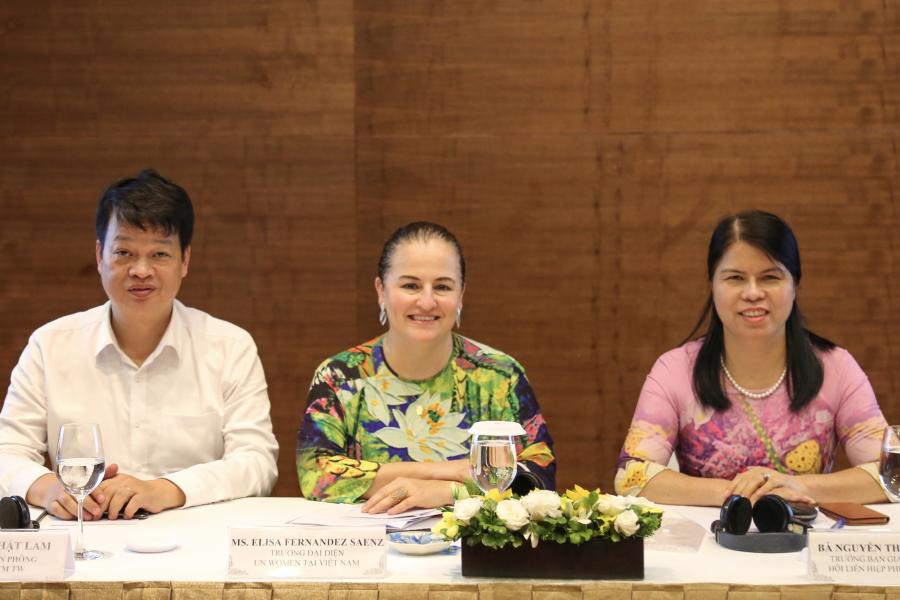Promoting Gender Equality in New Rural Development in Viet Nam
11 June 2020
- Workshop on Gender Mainstreaming in the National Targeted Programme on New Rural Development (NTP NRD)

Hanoi, 11 June 2020 – The United Nations Entity for Gender Equality and the Empowerment of Women (UN Women) in coordination with the Vietnam Women’s Union (VWU) and National Coordination Office of the NTP NRD held the Workshop on Gender Mainstreaming in the National Targeted Programme on New Rural Development. The workshop aims to share the findings on gender dimensions and women’s empowerment of the New Rural Development Programme in the period of 2010-2020, and based on this assessment, to make recommendations for gender mainstreaming in the next phase of the NTP NRD.
Achieving gender equality has been one of the prime concerns of many countries around the world. In Viet Nam, gender equality is also seriously considered by the Government in the policy making process, including the NTP NRD. Resolution No.26-NQ/TW of the Communist Party of Vietnam on agriculture, rural areas, and farmers is the foundation for the New Rural Development. The Resolution sets the targets for agriculture and rural development by 2020 and details eight main solutions. Out of these solutions, promotion of gender equality was briefly mentioned as a theme under solution 3 on improving the living standard of rural population.
“Accounting for 50% of the population, Vietnamese women play an important role in the fields of socio-economic development of the country in general, and in new rural development in particular. Women are key players in the development process and the beneficiaries of the Programme's achievements. With the functions and tasks of a representative socio-political organization: securing, protecting women's rights and legitimate interests, solidarity and mass gathering of women classes, Vietnam Women’s Union has performed well its core role in advocating, guiding and supporting women to participate in rural development”, Ms Do Thi Thu Thao, Vice President of Vietnam Women’s Union, emphasized the role of women in agriculture and rural development.
The National Targeted Programme on New Rural Development is arguably the most important initiative of Viet Nam in agriculture and rural development. In the context of reviewing 10 years of implementation of the Programme, in 2019, UN Women in collaboration with the Institute of Agriculture and Rural Development (IPSARD) and VWU participated and conducted an Independent Gender Review of the NTP NRD for the period of 2010-2020. The assessment was made using secondary data sources available, previous studies of NTP NRD, and a qualitative assessment with relevant stakeholders in five provinces (Ha Tinh, Quang Nam, Long An, Lam Đong, and Ha Noi), especially on the issues of gender, women empowerment and gender equality in the programme over the past 10 years.
One of the key findings of the research is that Gender equality was incorporated into the NTP NRD by Decision 1980/2016 as a sub-thematic issue. Accordingly, the indicator 18.6 on “Ensuring gender equality and domestic violence prevention and control; protecting and supporting vulnerable people in the sphere of family and social life” was introduced as one of 49 indicators under the 19 commune-level NRD criteria. This indicator 18.6 is among six indicators under the NRD criterion 18 on “Political system and legal access”. Having gender equality integrated as a sub-thematic indicator, this reflects a ‘partial’ and women-focused approach toward gender equality. Consequently, gender concerns have not been taken for consideration in the remaining NRD criteria such as socio-economic infrastructures, economy and production, access to public services (education and healthcare), or environmental protection. Notably, this is inconsistent with the Law on Gender Equality (e.g. Article 12 to Article 18 address gender equality as a cross-cutting issue).
It was then discussed in the workshop to consider whether or not making gender a cross-cutting issue in the NTP NRD. Having gender equality as a thematic issue confined in one indicator is probably the rooted cause of limited gender reflections in the implementation of the previous phases of the NTP NRD. It is strongly recommended that gender should be addressed as a cross-cutting socio-economic variable in the next phase of the NTP NRD. Accordingly, gender should be reflected in other contents of the NTP NRD and NRD criteria, whenever appropriate and relevant. This could be made by making different activities of the NTP NRD responsive to women’s voices and needs (rather than being confined in the activities toward the indicator 18.6). As a consequence, implementation of the NTP NRD will become gender sensitive in the sense that differences in needs of women and men, gender norms and roles are considered in planning and implementation of the NTP NRD activities. It is noted that having gender being a cross-cutting issue reflects the requirement of the Law on Gender Equality where gender is addressed as a cross-cutting socio-economic domain.
“Gender stereotypes and gender bias towards boys in giving birth, raising and taking care of children, family planning, etc. still exist in some families and a part of the population in society (including the areas that met NRD standards). In fact, the working time of women in the family is often longer than of men. In many localities, men are still considered to be the breadwinner, they have the power to make decisions on major issues, and are representatives in the community. The housework and care work for family members are still believed to be the "vocation" of women," Mr Tran Nhat Lam, Vice Chief of National Coordination Office of the NTP NRD, laid out some issues related to gender equality, women and families in NRD that need further attention and discussion.
In today’s workshop, UN Women, Vietnam Women’s Union, National Coordination Office of the NTP NRD and IPSARD shared and consulted on their assessment findings on the gender issues of the New Rural Development Programme over the past 10 years. And more importantly, the workshop has created a forum for researchers, policy makers and experts in this field to discuss ways to promote gender equality in new rural development in the period of 2021- 2030, as well as to promote gender equality in Viet Nam.
“Through this workshop, we wish to have a fruitful discussion about practical and feasible recommendations for the development of a gender-responsive programme that would ensure equal benefits and equal opportunities for all from 2021-2030. Such programme would not only contribute to boosting gender equality, efficient economic growth, but more importantly, moving toward to sustainable and inclusive development”, said Ms Elisa Fernandez Saenz, Head of Office, UN Women Viet Nam.
---
Media contact:
- Tran Linh, UN Women Viet Nam | Mobile: 077 910 2297 | Email: tran.linh@unwomen.org
- Nguyen Nga, UN Women Viet Nam | Mobile: 097 758 7978 | Email: nguyen.nga@unwomen.org



